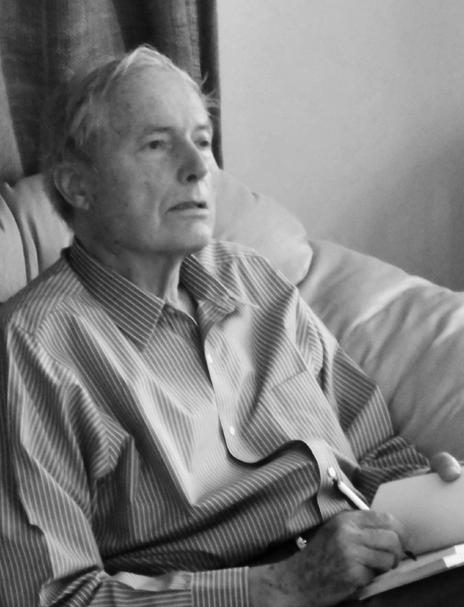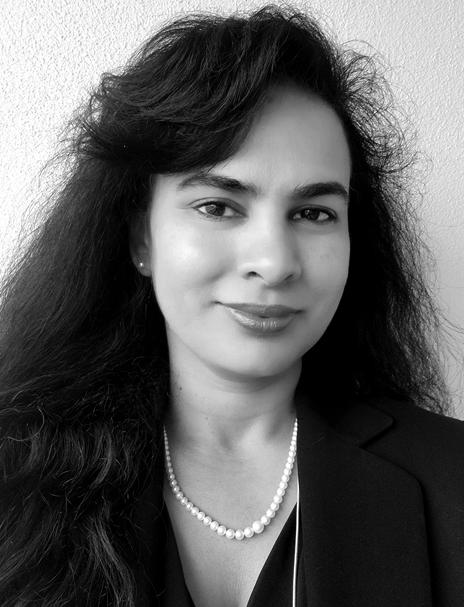
13 minute read
Dr Howard Richards What Teachers Can Do to Improve the Economies That Will Emerge After the Pandemic

Dr Howard Richards (born June 10, 1938) is a philosopher of Social Science who has worked with the concepts of basic cultural structures and constitutive rules. He holds the title of Research Professor of Philosophy at Earlham College, a liberal arts college in Richmond, Indiana, USA, the Quaker School where he taught for thirty years. He officially retired from Earlham College, together with his wife Caroline Higgins in 2007, but retained the title of Research Professor of Philosophy. A member of the Yale class of 1960, he holds a PhD in Philosophy from the University of California, Santa Barbara, a Juris Doctor (J.D.) from the Stanford Law School, an Advanced Certificate in Education (ACE) from Oxford University (UK) and a PhD in Educational Planning, with a specialization in applied psychology and moral education from the Ontario Institute for Studies in Education (OISE), University of Toronto, Canada. Dr Richards is a Catholic, a member of Holy Trinity (Santisima Trinidad) parish in Limache, Chile, and a member of the third order of St. Francis, S.F.O www.wikipedia.org
Advertisement
What economies and living conditions will be like after the coronavirus pandemic is a matter of uncertainty and foreboding. The pandemic may never go away. It may continue to propagate itself indefinitely. It may mutate several more times. If so, human cultures will not only have to evolve, but will have to evolve several times, in order to cope with changing physical realities. Surely, in any case, we human beings will be wiser to organize ourselves collectively to defend ourselves than we would be simply to wait while fate determines our destiny. In the process of species-self-defence, teachers are key.
This short note will be a sketch, or rather an illustration, of a proposal. As Peter Drucker and many others have said, intriguingly and I think to some extent truly, you cannot predict the future, but you can invent it. Quarantined, forbidden to leave the house, I have been watching more informational programs than Netflix. Three of them seemed especially relevant to defining the social responsibilities of education in 2020. The first of these was about cash flow management for business managers: ‘managing cash flow when revenue and funding dry up’. Most of the managers in the seminar felt threatened with bankruptcy by today´s recession. [1] Typically they expected to lose 35 to 40 percent of their revenue. The solutions considered by the presenters consisted mainly of demanding payment forcefully to maximize revenues as much as possible under the circumstances; and making careful choices about which bills to pay under the circumstances. The seminar leaders observed that the best managed businesses would survive, while the less well managed businesses would fail and cease to exist.
Photograph https://pixabay.com/photos/child-asian-kid-baby-girl-young-5058511/

The second was an interview with Noam Chomsky. [2] Chomsky urged that the end of the pandemic, when it comes, MUST NOT BE NEOLIBERALISM passed off as the return of NORMALCY. He cites facts showing that, especially in the United States, the pandemic itself was aggravated by heartless neoliberalism. For example: a ventilator manufacturer discontinued its line of inexpensive ventilators because it interfered with its sales of expensive ventilators. For a capitalist firm, that was normal, not abnormal. To paraphrase Pink Floyd, ‘We don´t want no normalcy!’
Thirdly, I attended some of the Weekly Economics Briefings of the New Economics Foundation, for example ‘Child Care Under Lockdown.’ They were about public policies for people markets do not provide for, and who therefore have to be provided for some other way. I learned that for most poor people in the UK raising the money to pay the rent and the utilities is more stressful than obtaining food.
Let these three programs represent three considerable swaths of our ‘students,’ the world´s population, for whom we proudly (perhaps too proudly) are ‘teachers’ or ‘teacher/learners.’ The three swaths are: those concerned with saving the businesses that are now providing jobs, products, services and profits; the indignados; and the losers in the marketplace (that is to say, those who do not sell enough at high enough prices to earn a decent living). What we must teach them, or facilitate everybody learning, is how to emerge from today´s pandemic plus economic collapse with economies that sustainably meet human needs in harmony with nature. The methodology some of us are proposing is called ‘unbounded organizing.’ [3] Its objective is to align across sectors for the common good. One of its premises is that the presently dominant system does not serve the true interests of even one single human being. [4]
Bounded? What that means can be seen from current responses of governments to the economic crisis triggered in many countries by the virus. (In other countries the economic crisis, which many have predicted for some time, had a different trigger. Here in Chile the trigger was an increase in subway fares the 18th of October, 2019. By the time the Coronavirus arrived we had already agreed on a new social compact and started writing a new constitution.) Whatever the trigger, the response tends to feature one or more ‘economic stimuli.’
Bounded? What that means can be seen from current responses of governments to the economic crisis triggered in many countries by the virus. (In other countries the economic crisis, which many have predicted for some time, had a different trigger. Here in Chile the trigger was an increase in subway fares the 18th of October, 2019. By the time the Coronavirus arrived we had already agreed on a new social compact and started writing a new constitution.) Whatever the trigger, the response tends to feature one or more ‘economic stimuli.’
The ‘stimuli’ presuppose a picture of an economy somewhat like a picture of a machine. Investment, as Keynes put it, is the causa causans that moves the machine. [5] The purpose of the stimuli is to make investors confident that their investments will be profitable. They consist of money in several forms: subsidies, tax cuts, loans, public works, public purchase of private debts unlikely to be paid, subsidies to consumers to encourage them to buy and thus make sales to them profitable… They have several sources: increasing the public debt, cutting other budget lines (e.g. education, and generally defunding the welfare state), creating more money by state fiat.
Concerning whether today´s wave of stimuli will solve today´s social and ecological problems, let me just say that I agree with what I suspect you already think. The thinking guiding mainstream governmental economic responses to the crisis attributed to the Coronavirus illustrates the meaning of ‘bounded.’ It assumes a world of self-interested actors each regarding himself or herself as the centre of the universe; the number of possible solutions to the problem is regarded as small; it is conventional; it does not question today´s dominant institutions.
‘Unbounded organizing’ emerged from experiences in community development organizing cooperatives for small producers of poultry and hogs In Botswana, in the movements resisting apartheid in South Africa;[6] from the work in northeast Brazil of Paulo Freire´s friend Clodomiro Santos de Morais running ‘laboratories’ where peasants learned how to organize by organizing,[7] from C.H.A.T. (Cultural Historical Activity Theory),[8] from the South African Research Chair in Development Education[9] and numerous other experiences and theories.
An Example of Unbounded Thinking and Topics for Discussion
Consider, for example, an ‘unbounded’ construction of the economies of the future that will emerge after the pandemic:
The exponential increases in the development and application of amazing new technologies should be organized to meet the needs of every human being in harmony with nature. [10]
Photograph https://pixabay.com/photos/shopping-spending-till-slip-879498/

3. The majorities who will be redundant in the labour market should and can be able to lead dignified and meaningful lives engaging in intrinsically worthwhile activities. It will no longer be required (for most people) to sell something or to contribute to making something to be sold (a ‘vendible commodity’ in Adam Smith´s definition of ‘productive’ [11] ) in order to earn money to buy what they need.
4. An example: a few of the millions of unemployed young people in South Africa were put to work singing and dancing. They had to audition to join the troupe. They needed talent to start with, and then they had to be punctual, neat and clean, drug-free, easy to get along with --and dedicated to practice practice practice. They performed for the students at local elementary schools. The performances were great successes, even though their impoverished young fans had no money to buy tickets. [12]
5. Where did the money to pay the young artists come from? Guy Standing emphasizes the importance of rents in financing a Universal Basic Income. The same can be said when outside funding discreetly supports an intrinsically desirable activity. [13] Rents (or surplus) can roughly be defined as money that can safely be moved to where it is more needed without unduly impairing the capacity of its source to continue producing. But the teachers and the students have to ponder the concepts of rent and surplus in much more detail if humanity is going to construct the new, humane, and green economies it needs.
6. Why did I write ´discreetly´ in the previous paragraph? Because on an unbounded organizing approach, local resources are organized first in response to locally identified problems. Outside supporters contribute resources (in this case the whole salaries of the artists) while encouraging local ownership (In this case as in many others the outside supporters never would have thought of the idea, much less organized it and run it).
7. The good news is that at a physical level, science is delivering to humanity the capacity to generate huge surpluses. The robots are more than happy to do nearly all the heavy lifting and most of the complicated thinking for us. They do not ask for vacations and they do not even need to sleep at night. But humanity lacks institutions to organize and ethically legitimate sharing the wealth with, and cheering the souls of, the millions who are no longer needed in the work force, and the other millions who never were needed in the work force.
From Socrates onward teachers have provoked learners to have long talks about questions with more than one answer. In 1637 in his Discourse on Method René Descartes complained: the ancients went on and on about virtue without ever establishing any definite conclusions resting on firm foundations. But Descartes missed something, Often the point is not to establish facts. It is to construct human relationships, institutions, social reality. In our case, the new economies cannot be built by the research methods Descartes pioneered and advocated. They require culture shifts.
I feel embarrassed because I must leave this topic when there are so many more issues that immediately cry out to be discussed. And there are so many ways that what I have already written could be easily misunderstood when it is delivered with so little context to explain it. I would beg the reader to put these ideas a little more in context by reading a four page summary of my philosophy which will be found here : https://researchoutreach.org/articles/moral-ethical-realism-unbounded-organization/
I will end with a few words concerning teachers nombre que Tú llevaste por la tierra.[14] I began with three samples of the population of the earth. It is a population that at this point in history must learn functional morals and ethics, hitting the ground as functional economies. First the stressedout managers. Second the outraged. Third the victims. The three can be compared to the three blind men grasping respectively the trunk, a leg and the tail of an elephant. Each lives a different reality; performs for a different generalized other; perfects (as best she or he can, with more or less motivation or discouragement) a different personality.
At this point I applaud what many teachers are already doing. They are facilitating activities showing that although any one of us only has a very partial view, we are all living in the same elephant. Our fates are joined. Our viewpoints are multiple.
From Socrates onward teachers have provoked learners to have long talks about questions with more than one answer. In 1637 in his Discourse on Method René Descartes complained: the ancients went on and on about virtue without ever establishing any definite conclusions resting on firm foundations. But Descartes missed something, Often the point is not to establish facts. It is to construct human relationships, institutions, social reality. In our case, the new economies cannot be built by the research methods Descartes pioneered and advocated. They require culture shifts.
2020 june © liveencounters.net
© Howard Richards
For the latter purposes, no findings are better established in the psychology of moral development than the salutary effects of understanding other people´s point of view, perspective-taking. [15] From Jean Piaget´s children playing marbles onwards; taking into account the feelings, needs and thoughts of others is a gateway to games with rules and institutions with norms. Perspective-taking appears to trigger the remarkable human capacity for what John Searle calls deontic ethics. Because their motives can be deontic, humans are capable of doing things they would not otherwise want to do, because it is their duty; because it is the rule; because it is the right thing to do.[16] Without this remarkable capacity we humans could not have created many institutions we take for granted, and without nurturing it we will not be able to create the new more ethical economies we need.
Photograph https://pixabay.com/photos/store-shop-market-signs-signage-1245758/

Lastly, I would like to mention an argument made some time ago by Georges Gusdorf. In the long run there is, he suggests, no reason for employing human teachers, as electronic devices become more effective and more inexpensive for learning subject after subject; except one decisive reason: To form responsible and caring people who will build responsible and caring institutions, it is indispensable for learners to interact with responsible and caring flesh and blood human beings.[17]
End Notes
1. Africa.com Liquidity: Managing Cash Flow When Revenue and Funding are Drying Up. April 22 1500 South Africa Time
2. Portside Chomsky and Pollin: To Heal From COVID-19 portside.org › 2020-04-20 ›
3. Gavin Andersson and Howard Richards (2015). Unbounded Organizing in Community. Lake Oswego OR: World Dignity University Press. www.unboundedacademy.org
4. Richard Wilkinson and Kate Pickett document the point that it does not serve the true interests of anybody to live in a highly unequal society. The Spirit Level. London: Allen Lane, 2009.
5. John Maynard Keynes (1937) The General Theory of Employment. The Quarterly Journal of Economics. Vol. 51, pp. 209-223. P. 221
6. Gavin Andersson (2018), Unbounded Governance. Riga: Scholars Press. (a 2004 doctoral dissertation at Open University UK)
7. Raff Carmen and Miguel Sobrado (Eds), (2000) A Future for the Excluded. London: Zed Books.
8. Gavin Andersson et al, (2018) Organisation Workshop: Beyond the Workplace. Mind, Culture and Activity. Vol. 25, pp. 86-99.
Perspective-taking appears to trigger the remarkable human capacity for what John Searle calls deontic ethics. Because their motives can be deontic, humans are capable of doing things they would not otherwise want to do, because it is their duty; because it is the rule; because it is the right thing to do.[16] Without this remarkable capacity we humans could not have created many institutions we take for granted, and without nurturing it we will not be able to create the new more ethical economies we need.
10. Peter H. Diamandis and Steven Kotler. (2012) Abundance: The Future Is Better Than You Think. New York: Free. Press.
11. Adam Smith (2012/1776) The Wealth of Nations. Position 5118 near the beginning of chapter three of book one. Digi reads Kindle edition www.digireads.com
12. This dancing and singing example is one of numerous examples found in my forthcoming book with Gavin Andersson, Economic Theory and Community Development. Lake Oswego, OR: World Dignity University Press.
13. Guy Standing, (2015) Basic Income --And How We Can Make It Happen. London, Penguin.
14. A famous quotation from a famous poem by the Chilean poet Gabriela Mistral. It means that when Jesus was on earth he was called a teacher. Gabriela was a teacher and a third order Franciscan.
15. John Gibbs (2019). Moral Development and Reality. Oxford: Oxford University Press.
16. John Searle (2010) Making the Social World. Oxford: Oxford University Press. Not in my view to be confused with Immanuel Kant´s deontic ethics, nor as general agreement with all Searle s approaches and views.
17. Georges Gusdorf (1963) Pourquoi des Professeurs? Paris: Payot.







